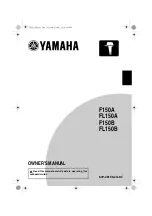
4-5
Chapter 4: AwardBIOS
IDE Primary Master PIO/IDE Primary Slave PIO/IDE
Secondary Master PIO/IDE Secondary Slave PIO
This IDE PIO (Programmed Input/Output) field allows you to set a PIO mode (0-
4) for the IDE Primary device: Mode 0 thorugh Mode 4 Each increase in number
indicates a corresponding increase in performance. The settings are "Mode 0",
"Mode 1", "Mode 2", "Mode 3", "Mode 4" and "Auto."
IDE Primary Master UDMA/IDE Primary Slave UDMA
IDE Secondary Master UDMA/IDE Secondary Slave UDMA
This option is available only when your IDE hard drive supports Ultra DMA/33
and the operating environment also includes a DMA drive (Windows 95 OSR2
or a third-party IDE bus master driver). If your IDE hard drive and your system
software both support Ultra DMA/33, select "Auto" to enable BIOS support. The
settings are "Auto" and "Disabled."
Video
This option allows the user to select the setting for the default video device.
The settings are "EGA/VGA", "CGA 40", "CGA 80" and "MONO."
HaltOn
This option allows the user to select the situation in which you want the BIOS
to stop the POST process and notify you about the status of the system. The
settings are "All Errors", "No Errors", "All but Keyboard", "All but Diskette",
and "All but Disk/Key."
Base Memory
This feature displays the amount of conventional memory detected during boot-
up. The default setting for this option is "640K."
Extended Memory
This feature displays the amount of extended memory detected during boot-up.
The default setting for this option is "65535K."
Summary of Contents for SUPER P4DC6
Page 1: ...SUPER P4DC6 SUPER P4DC6 USER S MANUAL Revision 1 1 SUPER...
Page 9: ...Chapter 1 Introduction 1 3 Notes...
Page 10: ...SUPER P4DC6 P4DC6 User s Manual 1 4 SUPER P4DC6 Figure 1 1 SUPER P4DC6 Image...
Page 11: ...Chapter 1 Introduction 1 5 SUPER P4DC6 Figure 1 2 SUPER P4DC6 Image...
Page 26: ...SUPER P4DC6 P4DC6 User s Manual 1 20 Notes...
Page 48: ...2 22 SUPER P4DC6 P4DC6 User s Manual Notes...
Page 80: ...SUPER P4DC6 P4DC6 User s Manual 4 26 Notes...














































